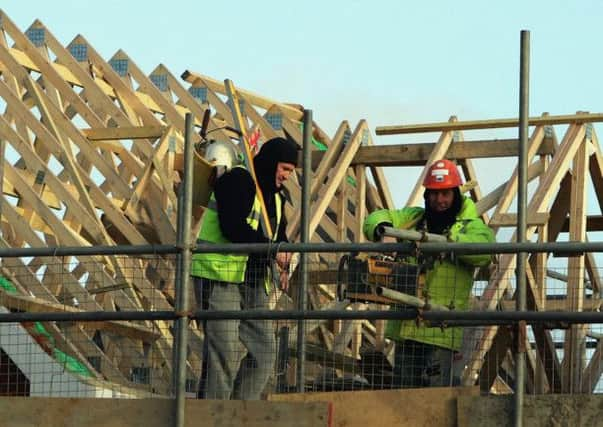Building the future through apprentices


In the early weeks of 2014, there is a sense of optimism in the construction industry. After the disastrous years of the economic downturn, with its mass lay-offs, the closing of long-standing and well-respected businesses and failures to make housing targets, a recovery is well underway.
But this upswing will be beset with its own set of problems. In order to meet Scotland’s demand for new and renovated houses, we’ll need to train enough people to do the work we so desperately need.
Advertisement
Hide AdAdvertisement
Hide AdEven before the recession, the building industry faced a skills shortage. Not enough school leavers were entering the industry, and there was a lack of training and support for aspiring builders.
The fact that the construction sector is returning to a period of sustained growth is welcome news. But unless immediate action is taken, we are heading for a major, systemic skills crisis.
At the height of the downturn, Construction Skills Network predicted the industry would require at least 3,360 new entrants each year to meet the demands of the market in Scotland. Today there are 190,000 construction workers in Scotland, but we urgently need to support and train the builders, joiners and roofers of tomorrow. Some parts of Scotland, such as Aberdeen, are already feeling the effects of the skills shortage. As our population increases, a chronic housing shortage is becoming more of a problem throughout the country.
There is clearly an urgent need for more construction workers in Scotland. Furthermore, this huge, fast-changing industry offers an incredible variety of opportunities to young people, ranging from stonemasonry to shopfitting, flooring to flat roofing. Learning these skills opens the door to a fulfilling, rewarding career.
Apprenticeships, a system that combines practical on-site training with off-site learning, are the best way to bring a new generation into the industry. Young people work alongside experienced mentors, gaining the combination of technical and practical skills they need.
As the largest trade association in the construction industry, the Federation of Master Builders understands the importance of apprenticeships. Our members have been training apprentices at a high rate since our founding in the 1940s. When asked what their top legislative priorities are, support for apprenticeships is always one of the answers.
The Scottish construction sector is rightly proud of its apprenticeship structure. In previous years, Scottish firms were up to seven times more likely to train apprentices than their counterparts south of the border. But many are still reluctant to make the commitment of taking them on, as it takes at best three years to repay the cost of training.
In late 2012, the Richard Review of Apprentices urged the government to create financial incentives for businesses to adopt apprenticeship schemes. We are in full agreement.
Advertisement
Hide AdAdvertisement
Hide AdEach year, thousands of school leavers want to enter the construction industry, but find it tough to get their foot on the ladder. Supporting apprenticeships would help these young people fulfill their ambitions – and this would also relieve some of the burden on small businesses, who provide the majority of training.
Employers must also be confident that apprenticeship programmes equip these young workers with the right skills and qualifications. This means they have to go beyond simply teaching “core skills”. Business owners should have more of an input to ensure apprentices learn practical, marketable skills. They want to know they are hiring new recruits who can make a real difference and hit the ground running.
There is also a need to raise awareness of apprenticeships. Each May in Scotland, The Construction Industry Training Board (CITB) organises an Apprenticeship Week, while schools and colleges should also play a role in educating young people about the opportunities available.
As the industry recovers, and demand for skills continues to rise, we hope the Government will make apprenticeships a priority in 2014.
• Grahame Barn is director of the Federation of Master Builders (FMB) Scotland
SEE ALSO